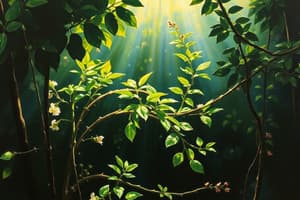Podcast
Questions and Answers
Which mechanism is primarily used by plants to transport water?
Which mechanism is primarily used by plants to transport water?
- Diffusion
- Transpiration (correct)
- Active transport
- Osmosis
What is the main function of chlorophyll in photosynthesis?
What is the main function of chlorophyll in photosynthesis?
- Capturing light energy (correct)
- Transporting nutrients
- Releasing oxygen
- Absorbing water
Which of the following is NOT a product of photosynthesis?
Which of the following is NOT a product of photosynthesis?
- Oxygen
- Water
- Carbon dioxide (correct)
- Glucose
Which factor does NOT significantly affect the rate of photosynthesis?
Which factor does NOT significantly affect the rate of photosynthesis?
During which phase of photosynthesis is carbon dioxide fixed into organic molecules?
During which phase of photosynthesis is carbon dioxide fixed into organic molecules?
ما هي العملية التي تُعتبر الأساس في تحول الطاقة الضوئية إلى طاقة كيميائية في النباتات؟
ما هي العملية التي تُعتبر الأساس في تحول الطاقة الضوئية إلى طاقة كيميائية في النباتات؟
أي من العوامل التالية يُعتبر غير أساسي في زيادة كفاءة التركيب الضوئي؟
أي من العوامل التالية يُعتبر غير أساسي في زيادة كفاءة التركيب الضوئي؟
أي من المركبات التالية يُعتبر منتجاً ناتجاً عن عملية التركيب الضوئي؟
أي من المركبات التالية يُعتبر منتجاً ناتجاً عن عملية التركيب الضوئي؟
أي عامل من العوامل التالية يُعدّ الأكثر تأثيرًا على معدلات التركيب الضوئي عند النباتات؟
أي عامل من العوامل التالية يُعدّ الأكثر تأثيرًا على معدلات التركيب الضوئي عند النباتات؟
ما هي المرحلة التي يتم فيها تصحيح سكر الجلوكوز كمنتج من عملية التركيب الضوئي؟
ما هي المرحلة التي يتم فيها تصحيح سكر الجلوكوز كمنتج من عملية التركيب الضوئي؟
Flashcards are hidden until you start studying
Study Notes
Plant Water Transport
- Transpiration: Plants primarily utilize transpiration to move water from roots to leaves.
Chlorophyll's Role
- Light Absorption: Chlorophyll, a pigment found in chloroplasts, absorbs light energy, particularly in the red and blue wavelengths. This absorbed energy is used to power the process of photosynthesis.
Photosynthesis Products
- Oxygen: Oxygen is a byproduct of photosynthesis, released as a gas.
Factors Affecting Photosynthesis
- Temperature: Photosynthesis rates generally increase with temperature up to a certain optimal point. Beyond that, high temperatures can damage enzymes involved in the process, leading to a decrease in photosynthesis.
Carbon Dioxide Fixation
- Calvin Cycle: Carbon dioxide fixation occurs during the Calvin cycle, the second phase of photosynthesis. It involves incorporating carbon dioxide from the atmosphere into organic molecules, using the energy stored in ATP and NADPH generated during the first phase of photosynthesis.
Water Transport in Plants
- Transpiration: Plants primarily use transpiration to transport water upwards from roots to leaves.
- Mechanism: Transpiration involves the evaporation of water from leaves, creating a negative pressure that draws water upwards through the xylem.
Chlorophyll's Role in Photosynthesis
- Light Absorption: Chlorophyll absorbs light energy, primarily in the red and blue wavelengths of the visible spectrum.
- Energy Transfer: The absorbed light energy is used to excite electrons within the chlorophyll molecule, initiating the process of photosynthesis.
Products of Photosynthesis
- Glucose: Photosynthesis produces glucose, a simple sugar that serves as primary energy storage for plants.
- Oxygen: Oxygen is a byproduct of photosynthesis and is released into the atmosphere.
- Water: Water is also produced as a byproduct of photosynthesis.
Factors Affecting Photosynthesis
- Light intensity: Increased light intensity generally increases the rate of photosynthesis, up to a saturation point.
- Carbon dioxide concentration: Higher carbon dioxide concentrations typically lead to faster photosynthesis rates, as it's a key reactant.
- Temperature: Optimal temperatures exist for photosynthesis, with excessive heat or cold inhibiting the process.
- Water availability: Water is essential for photosynthesis, and its shortage can significantly reduce the process's efficiency.
Carbon Dioxide Fixation in Photosynthesis
- Calvin Cycle: Carbon dioxide fixation occurs during the Calvin Cycle, the second stage of photosynthesis.
- Rubisco Enzyme: The enzyme Rubisco catalyzes the initial reaction of carbon fixation, where CO2 is incorporated into an organic molecule called RuBP.
Photosynthesis: Light into Chemical Energy
- Process: Photosynthesis is the process by which plants convert light energy into chemical energy stored in glucose.
- Stages: Two key stages are involved: the light-dependent reactions and the light-independent reactions (Calvin cycle).
Factors Affecting Photosynthesis Efficiency
- Light intensity: Adequate light intensity is crucial for efficient photosynthesis.
- Carbon dioxide concentration: Increasing CO2 levels within optimal ranges can enhance photosynthesis efficiency.
- Temperature: Optimizing temperature for the plant species is vital for maximizing photosynthetic efficiency.
Products of Photosynthesis
- Glucose: The primary product of photosynthesis, serving as a building block for other molecules and energy storage.
- Oxygen: Oxygen released as a byproduct of the light-dependent reactions.
Factors Influencing Photosynthesis Rates
- Light intensity: A key factor, as light energy drives the process, with an optimal level for each plant species.
- Carbon dioxide concentration: Essential for the Calvin cycle, with higher concentrations generally increasing photosynthetic rates.
- Temperature: Photosynthesis has an optimal temperature range, beyond which enzyme activity is inhibited.
Glucose Formation
- Calvin cycle: Glucose is ultimately formed during the Calvin cycle, where carbon dioxide is reduced into sugar molecules.
- Regeneration: The Calvin cycle also involves the regeneration of RuBP, which is crucial for further CO2 fixation.
Studying That Suits You
Use AI to generate personalized quizzes and flashcards to suit your learning preferences.



